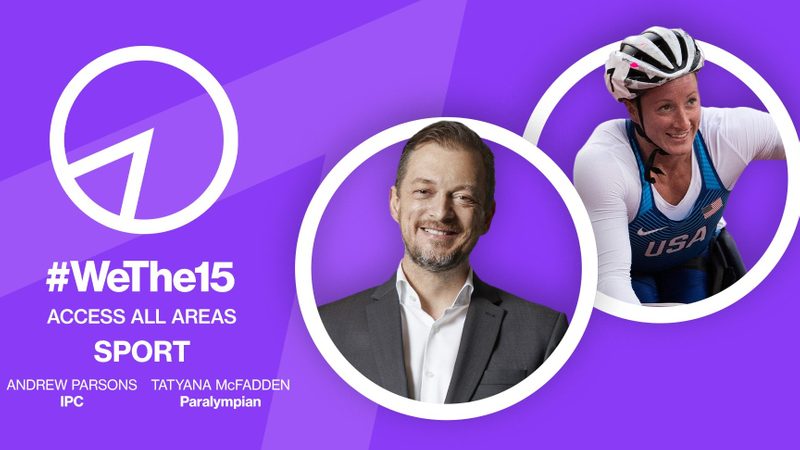
A purple graphic with white border and WeThe15 logo. It shows pictures of a man and a women inside circles. It reads '#WeThe15 Access All Areas, Sport; Andrew Parsons, IPC; and Tatyana McFadden, Paralympian.'
- The eighth episode of the WeThe15: Access All Areas podcast explores the role of Para sport in advancing the rights for persons with disabilities (PWD) and how athletes can become role models for future generations.
Ahead of the Paris 2024 Paralympic Games, the WeThe15: Access All Areas podcast released its eighth episode on the topic of sport, featuring International Paralympic Committee (IPC) President Andrew Parsons and one of the most decorated Paralympians of her generation, US wheelchair racer Tatyana McFadden.
In the episode McFadden, who has 20 Paralympic medals in summer and winter Paralympic Games, recalled how the Tatyana Law came to be:
“I had arrived home from the [Athens 2004] Paralympic Games with a silver and bronze medal. And I was excited to join high school because all I wanted to do was to be part of the track team. And as a two-time Paralympic medallist, I thought, oh, I would be welcomed with open arms. But that wasn't really the case for me.
“When I was allowed to join the track team, I was denied a uniform and denied the right to race alongside others on the track. And at that age, I was just devastated… So with my mom at my side, we brought suit against Howard County, Maryland, not for money, but for the right to be treated equally in sports.
“Our victory resulted in the creation of a new law. It's called the Sports and Fitness Equity Act. And it's been embraced nationwide, forever changing the face of high school athletics, and it's giving young people with disabilities the right to be fully equal in the world of sports in high school.”
McFadden and Parsons also discussed the role Paralympians play in advocating for disability rights and the power of the Paralympic Movement in changing perceptions about PWD.
Parsons said: “The Paralympic Games, it's way too powerful. Well, why sport is so powerful? Because you don't need to explain it, right? You see it, you feel it and interacts with your own values, the things you have learned through your whole life.
“And then it changes you in your own unique way. It's not someone preaching to you for over one hour about the rights of persons with disability or their potential, what they can do. So, the Paralympic Games and the Paralympic Movement, it's about showing to the world that if given opportunity, persons with disability can do whatever they want.
“… The [Tokyo 2020] Paralympic Games impacted 4.1 billion persons in accumulated audiences. These people, many of them, they don't have a disability. They are not involved with disability. They don't have a relative with disability, but they live in a world with 1.2 billion persons with disability. They need to know that. They need to understand it. That's the power of sport.”
McFadden added: “What most Paralympians should know is that you are just being an advocate by just going out and training on the track or going to your local gym because people do see that. ... So that part, you know, has a really powerful effect.”
The guests also discussed post-Games legacies, the impact Paris 2024 will have for disability rights in France and the potential global impact of LA28 which is now just a few years away.
For more details and the full episode, subscribe and listen to the series here.